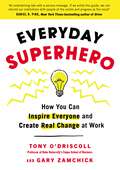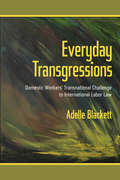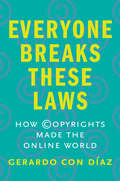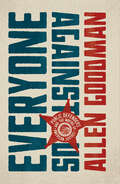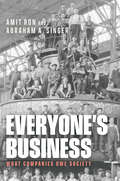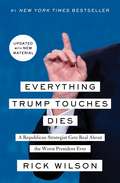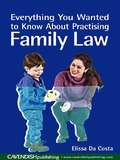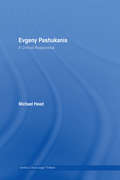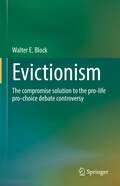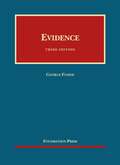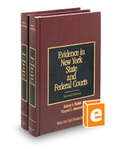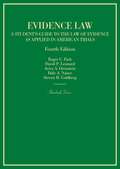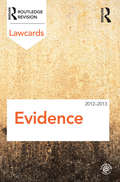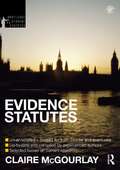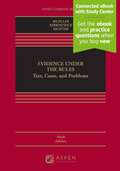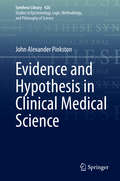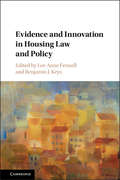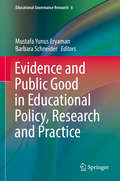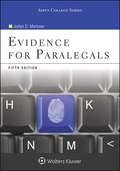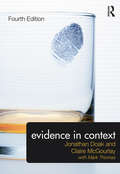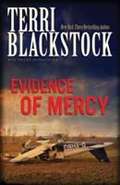- Table View
- List View
Everyday Superhero: How You Can Inspire Everyone And Create Real Change At Work
by Tony O'Driscoll Gary Zamchick'An entertaining tale with a serious message . . . we can rebuild our institutions with people at the centre and progress as the result!' Daniel H. Pink, bestselling author of DriveAre you struggling to create profound, lasting change in your organisation? Everyday Superhero is a simple story with a powerful solution. Meet a stressed young manager, Mae B, whose teams are being led by an authoritarian CEO. We join her on her mission to overhaul the outdated leadership systems obsessed by power, profit and process and fight for central leadership that prioritises people, purpose and principles. It's the start of a journey into a new vision of leadership, one that has been designed to take on the challenges that organisations face today. And if we follow Mae B's lead, we can all create change, when we need it most. Developed from the author's academic research at Duke University, this memorable adventure will help you create lasting change in complex and chaotic times.'This powerful book tells the story of how leaders can unlock every employee's superpower to create lasting change' Dorie Clark, bestselling author of The Long Game
Everyday Transgressions: Domestic Workers' Transnational Challenge to International Labor Law
by Adelle BlackettAdelle Blackett tells the story behind the International Labour Organization's (ILO) Decent Work for Domestic Workers Convention No. 189, and its accompanying Recommendation No. 201 which in 2011 created the first comprehensive international standards to extend fundamental protections and rights to the millions of domestic workers laboring in other peoples' homes throughout the world. As the principal legal architect, Blackett is able to take us behind the scenes to show us how Convention No. 189 transgresses the everyday law of the household workplace to embrace domestic workers' human rights claim to be both workers like any other, and workers like no other. In doing so, she discusses the importance of understanding historical forms of invisibility, recognizes the influence of the domestic workers themselves, and weaves in poignant experiences, infusing the discussion of laws and standards with intimate examples and sophisticated analyses. Looking to the future, she ponders how international institutions such as the ILO will address labor market informality alongside national and regional law reform. Regardless of what comes next, Everyday Transgressions establishes that domestic workers' victory is a victory for the ILO and for all those who struggle for an inclusive, transnational vision of labor law, rooted in social justice.
Everyone Breaks These Laws: How Copyrights Made the Online World
by Gerardo Con DiazCopyright&’s profound impact on the online world as we know it This book is a captivating exploration of the profound impact of American copyright law on our online lives. By telling stories about hope, art, greed, and fear and how they have affected the legal dimensions of creativity and technological change, this book uncovers the hidden forces shaping our digital world. Gerardo Con Díaz examines the strange world of online copyrights from the 1990s to today&’s AI-driven era, showing how our ability to immerse ourselves in digital media depends on the erosion of what it means for people to own their creative works, online and offline. He delves into the often overlooked impact of digital ownership on privacy and self-expression in this fascinating field guide to the complex landscape of online rights.
Everyone against Us: Public Defenders and the Making of American Justice (Chicago Visions and Revisions)
by Allen GoodmanA former public defender testifies to the vivid human suffering at the heart of America’s criminal justice system. As a public defender, Allen Goodman faced cross-examination from family and friends every day: How could he work to help criminals? How could he live with himself? Presumed guilty by association, Goodman quickly learned that people didn’t really want an answer; they wanted a justification, perhaps even an apology. Ever the idealist, Goodman answered anyway: Everyone deserves justice. Everyone against Us is Goodman’s testimony of his life as a public defender. In it, he documents his efforts to defend clients, both guilty and innocent, against routine police abuse, prosecutorial misconduct, and unjust sentencing. To work in criminal justice, Goodman shows, is to confront and combat vivid human suffering, of both victims and perpetrators. From sex trafficking, murder, and abuse to false conviction, torture, and systemic racism, Goodman describes the daily experiences that both rattled his worldview and motivated him to work ever harder. Part memoir, part exposé, Everyone against Us is the moving story of an embattled civil servant who staves off the worst abuses of the criminal justice system, at great personal cost.
Everyone's Business: What Companies Owe Society
by Amit Ron Abraham A. SingerBusiness is political. What are the ethics of it? Businesses are political actors. They not only fund political campaigns, take stances on social issues, and wave the flags of identity groups – they also affect politics in their everyday hiring and investment decisions. As a highly polarized public demands political alignment from the powerful businesses they deal with, what’s a company to do? Amit Ron and Abraham Singer show that the unavoidably political role of companies in modern life is both the fundamental problem and inescapable fact of business ethics: corporate power makes business ethics necessary, and business ethics must strive to mitigate corporate power. Because of its economic and social influence, Ron and Singer forcefully argue that modern business’s primary social responsibility is to democracy. Businesses must work to avoid wielding their power in ways that undermine key democratic practices like elections, public debate, and social movements. Pragmatic and urgent, Everyone’s Business offers an essential new framework for how we pursue profit—and democracy—in our increasingly divided world.
Everything Trump Touches Dies: A Republican Strategist Gets Real About the Worst President Ever
by Rick WilsonFrom Rick Wilson—longtime Republican strategist, political commentator, Daily Beast contributor—the #1 New York Times bestseller about the disease that is destroying the conservative movement and burning down the GOP: Trumpism. Includes an all-new chapter analyzing Trump&’s impact on the 2018 elections.In the #1 New York Times bestselling Everything Trump Touches Dies, political campaign strategist and commentator Rick Wilson delivers &“a searingly honest, bitingly funny, comprehensive answer to the question we find ourselves asking most mornings: &‘What the hell is going on?&’ (Chicago Tribune). The Guardian hails Everything Trump Touches Dies, saying it gives, &“more unvarnished truths about Donald Trump than anyone else in the American political establishment has offered. Wilson never holds back.&” Rick mercilessly exposes the damage Trump has done to the country, to the Republican Party, and to the conservative movement that has abandoned its principles for the worst President in American history. Wilson unblinkingly dismantles Trump&’s deceptions and the illusions to which his supporters cling, shedding light on the guilty parties who empower and enable Trump in Washington and in the media. He calls out the race-war dead-enders who hitched a ride with Trump, the alt-right basement dwellers who worship him, and the social conservatives who looked the other way. Publishers Weekly calls it, &“a scathing, profane, unflinching, and laugh-out-loud funny rebuke of Donald Trump and his presidency.&” No left-winger, Wilson is a lifelong conservative who delivers his withering critique of Trump from the right. A leader of the Never Trump movement, he warned from the start that Trump would destroy the lives and reputations of everyone in his orbit, and Everything Trump Touches Dies is a deft chronicle the tragicomic political story of our time. From the early campaign days through the shock of election night, to the inconceivable train-wreck of Trump&’s first year. Rick Wilson provides not only an insightful analysis of the Trump administration, but also an optimistic path forward for the GOP, the conservative movement, and the country. &“Hilarious, smartly written, and usually spot-on&” (Kirkus Reviews), Everything Trump Touches Dies is perfect for those on either side of the aisle who need a dose of unvarnished reality, a good laugh, a strong cocktail, and a return to sanity in American politics.
Everything You Need to Know About Custody
by Claudia B. ManleyAbout custody -- Two homes, one life: joint custody -- Custody goes to court -- Sole custody and visitation rights -- Living with someone other than a biological parent -- What about you?
Everything You Wanted to Know About Practising Family Law
by Elissa Da CostaFirst published in 2005. Routledge is an imprint of Taylor & Francis, an informa company.
Evgeny Pashukanis: A Critical Reappraisal (Nomikoi: Critical Legal Thinkers)
by Michael HeadA thorough examination of Pashukanis’ writings, this book is a significant contribution to a proper assessment of Pashukanis’ work, the value of his theoretical legacy and the contemporary relevance of Marxist legal theory. Interest in the best-known Soviet legal scholar, Evgeny Pashukanis, remains widespread and his work retains considerable relevance. His writings provide a rich source of material on the Marxist theory of law and the state, as well as the attempts to apply that doctrine in Soviet Russia. In this book, Michael Head considers Pashukanis’ work both within its historical context and in relation to contemporary legal theory, answering a range of questions including: How and why did Pashukanis emerge as the pre-eminent Soviet jurist from 1924 to 1930? Why did he come under only minor criticism from 1930 to 1936 and then be denounced and executed in 1937 as a 'Trotskyite saboteur'? Why have many Western scholars generally praised the quality and originality of Pashukanis’ work, yet also drawn the conclusion that his fate illustrates the intrinsic impossibility of the entire communist project? Serving as an introduction to Pashukanis and Marxist legal theory and a timely contribution in light of the universal assault on civil liberties in the indefinite 'War on Terror' and the constant escalation of 'law and order' measures in Western societies, this volume is an invaluable resource for those interested in jurisprudence and critical thought.
Evicitionism: The compromise solution to the pro-life pro-choice debate controversy
by Walter E. BlockThis book applies libertarian property rights theory to a vexing controversy, abortion. This book offers a compromise solution that will not fully please either of the two sides of this debate, but, is the only possible reconciliation between the two. Nor are its benefits limited to the fact that the opposing forces in this debate may be brought together. Evictionism, also, is the only philosophical position compatible with human rights; neither of the other two can make this claim.There are many other publications and learned articles supporting the pro-life position as well as defending the pro-life viewpoint. This is the only book that offers a perspective on abortion that is radically different than both. This book uniquely applies private property rights theories we all agree upon when referred to issues such as real estate, crime, torts, etc., to abortion. The underlying philosophical contribution of Evictionism this book presents is that these basic legal premises can be utilized in this controversial case as well as practically everywhere else in law.Want to solve the abortion controversy? Want to demonstrate that both the pro-life and the pro-choice positions are erroneous? Want to read about a position that is a compromise between the pro-life and the pro-choice positions? Then this book provides robust understanding, discussions and applications for getting to the truth about this issue.
Evidence In New York State And Federal Courts (New York Practice Series #Second Edition, Volume 5)
by Robert A. Barker Vincent C. AlexanderEVIDENCE IN NEW YORK STATE AND FEDERAL COURTS SECOND EDITION Volume 5
Evidence In New York State And Federal Courts 2d (New York Practice Series #Volume 5A)
by Robert A. Barker Vincent C. AlexanderThis comprehensive publication on the law of evidence in New York includes a summary of corresponding law under the Federal Rules of Evidence (FRE). The authors synthesize and explain the complex mix of cases and statutes, while examining the purpose and requirements of the rules, together with discussion of leading cases. The title also includes New York's evidence statutes and the relevant FRE in their restyled format. Chapters cover general principles, judicial notice, burden of proof and presumptions, relevancy, privileges, witnesses, opinions and expert testimony, hearsay, authentication and identification, best evidence, and real and demonstrative evidence.
Evidence Law: A Student's Guide to the Law of Evidence as Applied in American Trials (Hornbooks)
by Steven Goldberg David Leonard Roger Park Aviva Orenstein Dale NanceIn clear and engaging prose that makes concepts accessible without oversimplification, this Treatise explains the Federal Rules, selected state variations, major cases, essential doctrines, and important underlying policies. Frequent practical examples drawn from courtroom practice introduce students to courtroom procedure, provide a context in which evidence problems arise, and acquaint them with the language of the courtroom. This volume can serve as background for beginning students and as a one-stop refresher for those taking advanced courses. Professors can assign various sections to track the syllabus or simply recommend this book as useful background reading.
Evidence Lawcards 2012-2013 (Lawcards)
by RoutledgeRoutledge Lawcards are your complete, pocket-sized guides to key examinable areas of the undergraduate law curriculum and the CPE/GDL. Their concise text, user-friendly layout and compact format make them an ideal revision aid. Helping you to identify, understand and commit to memory the salient points of each area of the law, shouldn’t you make Routledge Lawcards your essential revision companions? Fully updated and revised with all the most important recent legal developments, Routledge Lawcards are packed with features: Revision checklists help you to consolidate the key issues within each topic Colour coded highlighting really makes cases and legislation stand out Full tables of cases and legislation make for easy reference Boxed case notes pick out the cases that are most likely to come up in exams Diagrams and flowcharts clarify and condense complex and important topics '...an excellent starting point for any enthusiastic reviser. The books are concise and get right down to the nitty-gritty of each topic.' - Lex Magazine Routledge Lawcards are supported by a Companion Website offering: Flashcard glossaries allowing you to test your understanding of key terms and definitions Multiple Choice Questions to test and consolidate your revision of each chapter Advice and tips to help you better plan your revision and prepare for your exams Titles in the Series: Commercial Law; Company Law; Constitutional Law; Contract Law; Criminal Law; Employment Law; English Legal System; European Union Law; Evidence; Equity and Trusts; Family Law; Human Rights; Intellectual Property Law; Jurisprudence; Land Law; Tort Law
Evidence Matters
by Susan HaackIs truth in the law just plain truth - or something sui generis? Is a trial a search for truth? Do adversarial procedures and exclusionary rules of evidence enable, or impede, the accurate determination of factual issues? Can degrees of proof be identified with mathematical probabilities? What role can statistical evidence properly play? How can courts best handle the scientific testimony on which cases sometimes turn? How are they to distinguish reliable scientific testimony from unreliable hokum? These interdisciplinary essays explore such questions about science, proof, and truth in the law. With her characteristic clarity and verve, Haack brings her original and distinctive work in theory of knowledge and philosophy of science to bear on real-life legal issues. She includes detailed analyses of a wide variety of cases and lucid summaries of relevant scientific work, of the many roles of the scientific peer-review system, and of relevant legal developments.
Evidence Statutes 2012-2013 (Routledge Student Statutes)
by Claire McGourlay‘Focused content, layout and price - Routledge competes and wins in relation to all of these factors’ - Craig Lind, University of Sussex, UK ‘The best value and best format books on the market.’ - Ed Bates, Southampton University, UK Routledge Student Statutes present all the legislation students need in one easy-to-use volume. Developed in response to feedback from lecturers and students, this book offer a fully up-to-date, comprehensive, and clearly presented collection of legislation - ideal for LLB and GDL course and exam use. Routledge Student Statutes are: • Exam Friendly: un-annotated and conforming to exam regulations • Tailored to fit your course: 80% of lecturers we surveyed agree that Routledge Student Statutes match their course and cover the relevant legislation • Trustworthy: Routledge Student Statutes are compiled by subject experts, updated annually and have been developed to meet student needs through extensive market research • Easy to use: a clear text design, comprehensive table of contents, multiple indexes and highlighted amendments to the law make these books the most student-friendly Statutes on the market Competitively Priced: Routledge Student Statutes offer content and usability rated as good or better than our major competitor, but at a more competitive price • Supported by a Companion Website: presenting scenario questions for interpreting Statutes, annotated web links, and multiple-choice questions, these resources are designed to help students to be confident and prepared.
Evidence Under The Rules: Text, Cases, And Problems (Aspen Casebook Ser.)
by Christopher B. Mueller Laird C. Kirkpatrick Liesa RichterEvidence Under the Rules: Text, Cases, and Problems is one of the most widely-adopted Evidence casebooks ever published. Structured around the Federal Rules of Evidence, the book contains carefully edited cases and secondary materials, as well as numerous problems that allow students to apply concepts during classroom exercises or on their own. Text boxes provide interesting background on select cases and additional perspectives on key issues. The Ninth Edition has been updated to include the most recent Evidence cases and developments, as well as insights into recent and pending amendments to the Federal Rules. It has been streamlined by shortening or eliminating some notes, making it even more user-friendly. It contains applications of evidence law to factual scenarios that students are likely to find particularly interesting.
Evidence and Hypothesis in Clinical Medical Science (Synthese Library #426)
by John Alexander PinkstonIn this book, the author argues that no current philosophical theory of evidence in clinical medical science is adequate. None can accurately explain the way evidence is gathered and used to confirm hypotheses. To correct this, he proposes a new approach called the weight of evidence account. This innovative method supplies a satisfactory explanation and rationale for the “hierarchical pyramid” of evidence–based medicine, with randomized clinical trials and their derivatives, meta-analyses, and systematic reviews of randomized clinical trials at the top and case reports, case series, expert opinion, and the like at the bottom. The author illustrates the development of various “levels” of evidence by considering the evolution of less invasive surgical treatments for early breast cancer. He shows that the weight of evidence account explains the notion of levels of evidence and other efforts to rank them. In addition, he presents a defense of randomization as a method to maximize accuracy in the conduct of clinical trials. The title also considers ethical issues surrounding experimentation with medical therapies in human subjects. It illustrates and discusses these issues in studies of respiratory therapies in neonates and treatment for certain cancers in adults. The author shows that in many cases sufficient evidence can be accrued to warrant generally accepted new therapies without the need for evidence derived from randomized clinical trials.
Evidence and Innovation in Housing Law and Policy
by Benjamin J. Fennell Lee Anne KeysNo area of law and policy is more central to our well-being than housing, yet research on the topic is too often produced in disciplinary or methodological silos that fail to connect to policy on the ground. This pathbreaking book, which features leading scholars from a range of academic fields, cuts across disciplines to forge new connections in the discourse. In accessible prose filled with cutting-edge ideas, these scholars address topics ranging from the recent financial crisis to discrimination and gentrification and show how housing law and policy impacts household wealth, financial markets, urban landscapes, and local communities. Together, they harness evidence and theory to capture the 'state of play' in housing, generating insights that will be relevant to academics and policymakers alike. This title is also available as Open Access.
Evidence and Public Good in Educational Policy, Research and Practice
by Barbara Schneider Mustafa Yunus EryamanThis volume draws together interdisciplinary approaches from political philosophy, social work, medicine and sociology to analyze the theoretical foundations and practical examples of evidence-based and evidence-informed education for the public good. It presents a range of conceptions of the evidence-based and evidence-informed education and a justification for why the particular examples or issues chosen fit within that conception for the sake of public good. It explores the current literature on evidence-based and evidence-informed educational policy, research and practice, and introduces a new term, 'evidence free', meaning actions of some policymakers who disregard or misuse evidence for their own agenda. The demands about the quality and relevance of educational research to inform the policy and practice have been growing over the past decade in response to the Evidence-Based Education movement. However the literature is yet to tackle the question of the interrelationships between evidence, research, policy and practice in education for the public good in an international context. This book fills that gap.
Evidence and the Archive: Ethics, Aesthetics and Emotion
by Trish Luker Katherine BiberThis collection explores the stakes, risks and opportunities invoked in opening and exploring law’s archive and re-examining law’s evidence. It draws together work exploring how evidence is used or mis-used during the legal process, and re-used after the law’s work has concluded by engaging with ethical, aesthetic or emotional dimensions of using law’s evidence. Within socio-legal discourse, the move towards ‘open justice’ has emerged concurrently with a much broader cultural sensibility, one that has been called the "archival turn" (Ann Laura Stoler), the "archival impulse" (Hal Foster) and "archive fever" (Jacques Derrida). Whilst these terms do not describe exactly the same phenomena, they collectively acknowledge the process by which we create a fetish of the stored document. The archive facilitates our material confrontation with history, historicity, order, linearity, time and bureaucracy. For lawyers, artists, journalists, publishers, curators and scholars, the document in the archive has the attributes of authenticity, contemporaneity, and the unique tangibility of a real moment captured in material form. These attributes form the basis for the strict interpretive limits imposed by the rules of evidence and procedure. These rules do not contain the other attributes of the archival document, those that make it irresistible as the basis for creative work: beauty, violence, surprise, shame, volume, and the promise that it contains a tantalising secret. This book was previously published as a special issue of Australian Feminist Law Journal.
Evidence for Paralegals (Aspen College Series)
by Joelyn D. MarloweCovers topics, including gathering evidence, interviewing witnesses, and researching. Written from a real-life perspective, showing how actual practice works in local, state, and federal court. Pedagogy in text developed for paralegal students, and includes short case summaries, readable examples, marginal definitions of terms, marginal cross-references to the Rules of Evidence, review questions, and hypotheticals. Short, concise presentation is ideal for paralegal courses. Updated with changes to the Federal Rules of Evidence and with new cases.
Evidence in Context
by Mark Thomas Jonathan Doak Claire McGourlayEvidence in Context explains the key concepts of evidence law in England and Wales clearly and concisely, set against the backdrop of the broader political and theoretical contexts. The book helps to inform students of the major debates within the field, providing an explanation as to how and why the law has developed as it has. This fourth edition has been revised and expanded to include developments in the law of hearsay evidence as well as recent litigation surrounding witness anonymity orders, bad character and vulnerable witnesses. It also addresses the on-going controversy and debate about the use of expert witnesses. A brand new chapter considers the contentious issue of public interest immunity, and the introductory chapter has been substantially expanded to consider the?continuing interplay between the UK courts and the European Court of Human Rights as the role of human rights in evidence becomes increasingly important. Features include: Key learning points to summarise the major principles of evidence law Practical examples to help students understand how the rules are applied in practice Self-test questions to encourage students to reflect on what they have learned A supporting companion website including answers to self-test questions Well-written, clear and with a logical structure throughout, Evidence in Context contains all the information necessary for any undergraduate evidence law module.
Evidence of Mercy (Sun Coast Chronicles #1)
by Terri BlackstockTake a fast-paced flight into suspense, romance, and forgiveness! When Lynda Barrett's plane malfunctions, the crash landing injures its prospective buyer, Jake. An investigation reveals that someone tampered with her plane---and it soon becomes clear that whoever it was has further murderous designs on Lynda.
